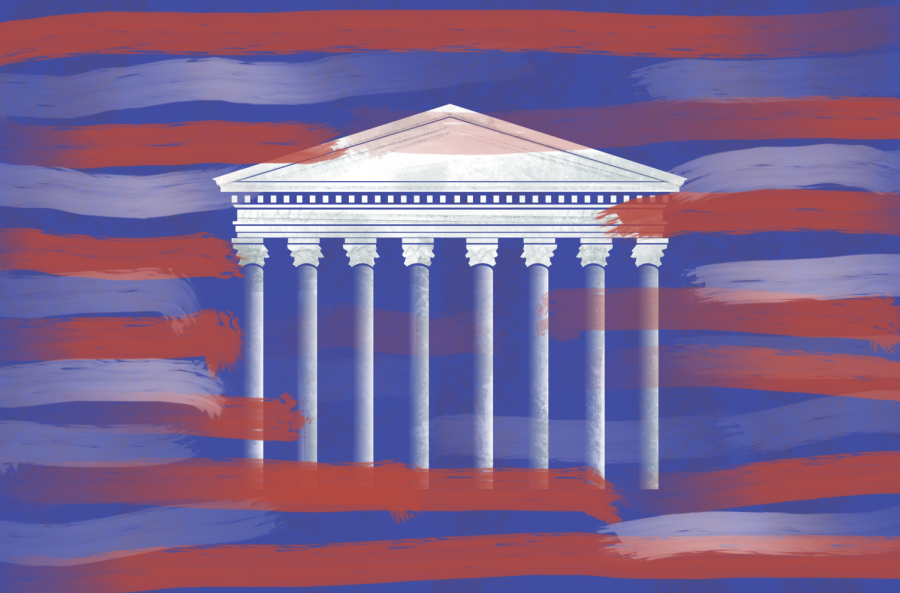A Supremely Important Year in Constitutional Law
A year of landmark decisions concludes as the Supreme Court begins its 2022-2023 term Oct. 3. Divisive decisions drew outrage and praise from political leaders and the American people alike.
In Dobbs v. Jackson, the Supreme Court decided in a 6-3 ruling that the Constitution does not guarantee the right to an abortion. This decision overturned both Roe v. Wade and Planned Parenthood v. Casey, which had cited the Fourteenth Amendment as a protection of abortion access within the first trimester of pregnancy. While Dobbs v. Jackson does not criminalize abortion, it returns the ruling to state officials rather than federal ones.
After the initial draft of Dobbs v. Jackson was leaked in May, protesters nationwide took to the streets to demand nationwide access to abortion. In Capitol Hill, students from local high schools, University of Washington and Seattle University donned green bandanas and marched to Seattle Central College. Though Washington law still asserts that “all people have the right to choose or refuse to have an abortion,” numerous states are enforcing bans.
Mona Walia, the owner and director of All Women’s Health, has continued to provide reproductive healthcare services in Tacoma. Trigger laws across the country have caused many to seek abortions outside their home states, including Wash. Despite a massive influx of patients seeking care, Walia remains hopeful in providers’ ability to help patients.
“The most immediate impact has been support, and that’s been huge,” Walia said. “I’m always full of hope—we can see everyone, we can make it happen. I got news of the decision as I was standing outside the clinic, and just said, ‘Okay, we have patients to see. Let’s go see them.’”
Many, including Walia, have noted that Dobbs v. Jackson’s impact stretches beyond abortion access alone. Justice Clarence Thomas wrote in his concurring opinion that the court should also seek to reconsider other due process precedents including Griswold v. Connecticut, Lawrence v. Texas and Obergefell v. Hodges. These decisions that protect same-sex marriage and access to contraception have not yet been codified into law.
“We’ve lost bodily autonomy, we’ve lost our rights, we’ve gone back. It goes so much further than abortion in itself, so I truly think we’re all affected. No matter what state you’re in,” Walia said.
Only a few days later in its decision on West Virginia v. Environmental Protection Agency (EPA), the court ruled that the EPA was overextending its authority in the Clean Power Plan, which was ultimately repealed by the agency. The plan was meant to regulate the carbon emissions of power plants. It was replaced with the Affordable Clean Energy Rule, which similarly sought to lower carbon emissions but with fewer restrictions.
Joylyn Golondrina, a second-year environmental studies major and member of Seattle U’s Engineers for a Sustainable World club, shared concerns about the United States’ efforts to sustain environmental protection.
“Thinking about the fact that we are going to have to live in a world that looks nothing like the one we live in today is terrifying. We’re already not doing anywhere near enough to sustain the world, and this means that we will somehow be doing even less,” Golondrina said.
These were not the only decisions to attract criticism, however. In Kennedy v. Bremerton School District, the court ruled that a public school football coach’s ability to lead his team in prayer at games was protected by the First Amendment, drawing praise from religious conservatives. Judge Sotomayor wrote in her dissenting opinion of Kennedy v. Bremerton School District that the court’s decisions are furthering the country down a perilous path of entanglement between religion and state.
While these decisions are being made at the highest circuits of judicial review, some students feel alienated from their ability to make a meaningful impact in their communities. Gretchen Franz, a second-year Political Science major, shared her reaction to the news of Roe v. Wade being overturned.
“I think it was the recognition that something that has felt so institutionalized is so fragile, it was a startling feeling of how much power nine people have over the fate of the country when they are so disconnected from the people that they serve,” Franz said.
One way that students stay connected to federal institutions, legislation and political change is by keeping up to date. Throughout a year of particularly impactful decisions, students have valued staying informed and spreading awareness.
“I believe in educating yourself, I think it’s crucial to put in the effort to know what’s going on,” Golondrina said.
As the Supreme Court’s year ends and begins, students and citizens look forward to the upcoming year of judicial review. Their civic participation will include keeping a close eye on next year’s set of selected cases.


